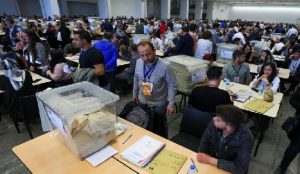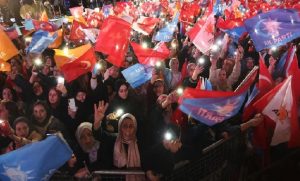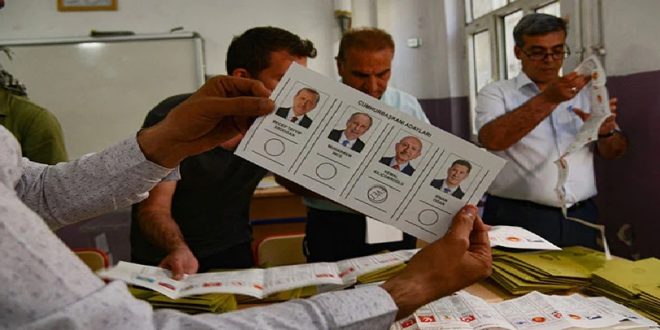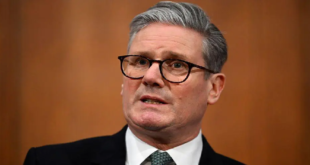16-05-2023
ANKARA: Turkey’s historic election is likely heading towards a runoff after a contentious night, during which President Recep Tayyip Erdogan’s secular rivals challenged the ballot count.
According to the Anadolu state news agency, the conservative leader, aged 69, had secured 49.86% of the votes,  while his secular rival Kemal Kilicdaroglu trailed with 44.38%. Anadolu’s data was based on counting 90.6% of the ballots. To avoid the first-ever election runoff in Turkey’s 100-year history, one of the candidates needed to surpass the 50% threshold. However, the secular opposition led by Kilicdaroglu claimed irregularities in the count. Kilicdaroglu, aged 74, tweeted that they were leading.
while his secular rival Kemal Kilicdaroglu trailed with 44.38%. Anadolu’s data was based on counting 90.6% of the ballots. To avoid the first-ever election runoff in Turkey’s 100-year history, one of the candidates needed to surpass the 50% threshold. However, the secular opposition led by Kilicdaroglu claimed irregularities in the count. Kilicdaroglu, aged 74, tweeted that they were leading.
Prominent figures from the opposition alleged that the government deliberately delayed the count in districts where Kilicdaroglu had strong support. Istanbul’s opposition mayor, Ekrem Imamoglu, stated that they were contesting the count from ballot boxes where they were significantly ahead. According to the opposition’s internal vote count, Kilicdaroglu had obtained 49% of the vote, while Erdogan had 45%. Nevertheless, both the state media count and the opposition’s count leave open the possibility of another presidential vote in two weeks.
The election night drama underscored the high stakes involved, with an expected turnout of 90%. The election has effectively become a referendum on Erdogan, Turkey’s longest-serving leader, and his Islamic-rooted party. Erdogan has guided the nation of 85 million through a transformative and divisive period, positioning Turkey as a military and geopolitical heavyweight involved in conflicts from Syria to Ukraine. The election outcome carries critical significance for Washington, Brussels, Damascus, and Moscow due to Turkey’s NATO membership and its influence in both Europe and the Middle East.
 Erdogan is widely supported in conservative regions of Turkey that experienced significant development during his rule. Religious voters appreciate his lifting of secular-era restrictions on headscarves and the introduction of more Islamic schools. After casting his ballot in Istanbul, Erdogan expressed hope for a positive outcome for Turkish democracy and the future of the country. However, his second decade in power has been marked by social and political turmoil, including a failed coup attempt in 2016 and subsequent purges.
Erdogan is widely supported in conservative regions of Turkey that experienced significant development during his rule. Religious voters appreciate his lifting of secular-era restrictions on headscarves and the introduction of more Islamic schools. After casting his ballot in Istanbul, Erdogan expressed hope for a positive outcome for Turkish democracy and the future of the country. However, his second decade in power has been marked by social and political turmoil, including a failed coup attempt in 2016 and subsequent purges.
The emergence of Kilicdaroglu and his opposition alliance, consisting of six parties, provides foreign allies and Turkish voters with a clear alternative. A potential runoff on May 28 would allow Erdogan time to regroup and reshape the debate, but he would continue to face challenges posed by Turkey’s severe economic crisis and criticism of his government’s response to the recent earthquake.
Kilicdaroglu expressed optimism about the country’s future, stating that democracy would prevail. Pre-election polls indicated that Kilicdaroglu was expected to win the youth vote by a significant margin, reflecting dissatisfaction with the current economic situation. However, supporters of Erdogan highlight the progress made during his tenure and question the feasibility of a coalition government consisting of six parties. (Int’l News Desk)
 Pressmediaofindia
Pressmediaofindia




